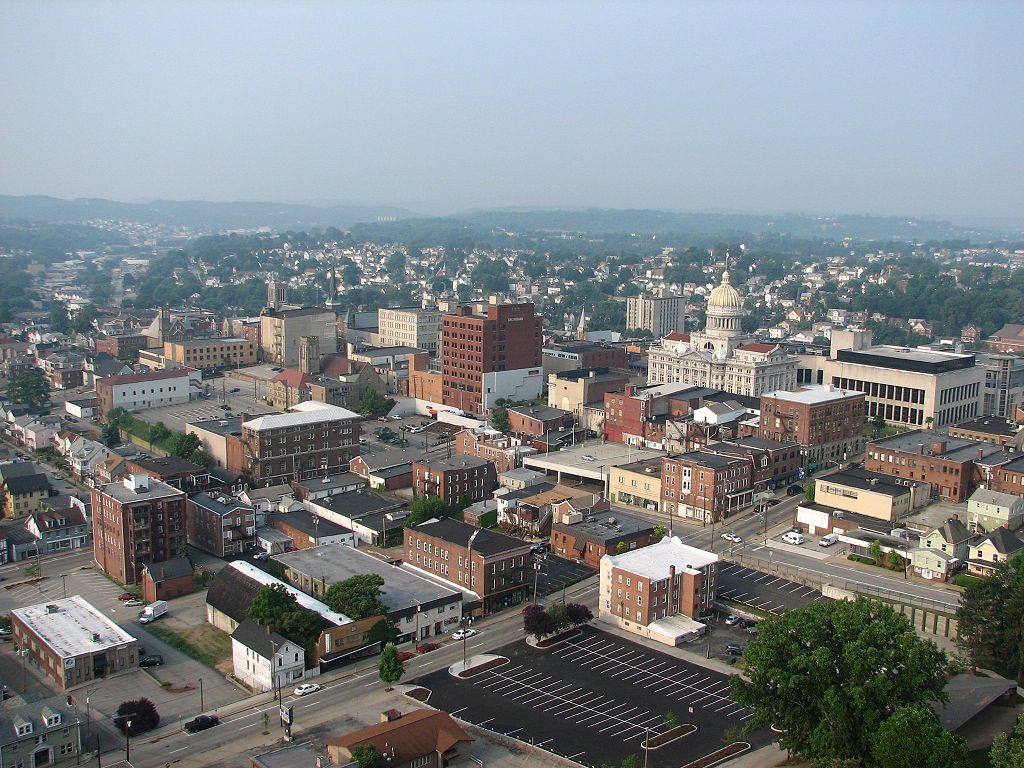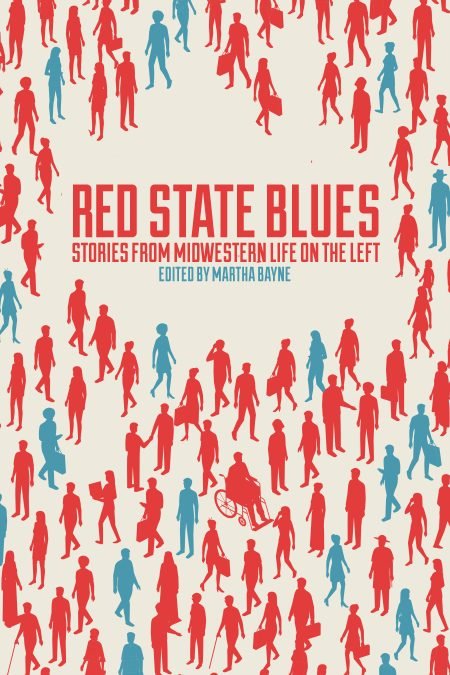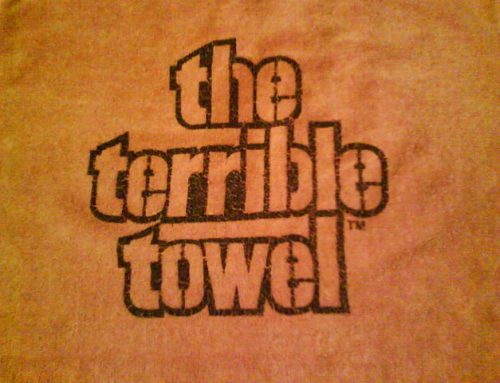By Annie Maroon
Five years after I left, I got Pennsylvania inked into my skin. It was my second autumn post-college, and the notion that I might never live in my home state again was sinking in. So I decided to carry the state outline on my left shoulder, with the major rivers of the western third, where I grew up, drawn in blue.
I knew by junior high that I would leave Greensburg as soon as I was old enough. Both of my parents left the states where they grew up by their early twenties. My mom left Ohio for New Orleans, and my dad departed West Virginia for North Carolina. (Both eventually circled back to Pittsburgh; that part of the arc is only now beginning to seem relevant to me.)
At eighteen, I chose Boston. I almost never got homesick in college. That came later, once I became what you’d call a permanent resident of Massachusetts rather than a college kid. I spent a summer in western Massachusetts thinking about the mountains and creeks I grew up with, thinking about a cockeyed, hilly city where three rivers intersect, crossed by iconic bridges. I missed the geography, and I missed the people. My brother and I had left, but almost my entire extended family lives within a few hours of Pittsburgh.
And I thought a lot about the realization that hit me when I was seventeen and about to leave: that I would always be shaped by this place. I could roll my eyes and despair over the people around me in my rural-suburban county who never seemed to want to travel farther away than Pittsburgh. I could cast around for something fun to do with friends and wind up at the mall or the 24-hour Eat ‘n’ Park, because there was nothing else. But all that was part of me. I never wanted to get so far from home, mentally, that I forgot that.
Some states are iconic. Their names and shapes are evocative, synonymous with a way of life. Pennsylvania doesn’t have that. It’s a big state, but not big enough to have the outsized fantasies attached to it that California, Texas, or even Alaska have. It has major cities, but no New York or Chicago or Los Angeles. It’s a perpetual swing state, voting Democratic in presidential elections all my life (until last fall), but never overwhelmingly enough to gain a reputation for it. People sometimes see the western part of my tattoo and ask if it’s Massachusetts, mistaking the Allegheny River for the Connecticut. Others have squinted at it, running through the middle of the country in their minds: Ohio? Colorado?

Downtown Greensburg, Pennsylvania [credit: By David Fulmer (https://www.flickr.com/photos/daveynin/526609621/), via Wikimedia Commons]
The first election I really experienced was 2000. I was nine years old, in fourth grade, and it was the first time I realized just how different my family was from the families of my classmates. Kids talked, in the way kids do, about how they would vote for George W. Bush, because their parents were. In my fourth-grade class of about 25 kids, only two of us—my friend Marissa and I—were in Al Gore’s camp. (One other boy implied that he might have been with us, but he didn’t exactly want to stick his neck out. He and I are Facebook friends now, which means I saw his pro-Trump posts last fall.)
That was it: Marissa and I, taking whatever insults a bunch of vaguely conservative fourth-graders could hurl at us. We snapped back at our classmates pretty well, as I remember it, and the election went on for a month. At the end of it, George Bush was president, and I felt somehow separate from the kid who had entered the school year, terrified of having anyone pay attention to her. I was different, and now everybody knew it.
In eighth grade, my mother took me to a rally in downtown Greensburg before the 2004 election, where I hollered across the street at a friend’s father, who was waving an inflatable dolphin to mock John Kerry’s “flip-flopping.” I absorbed my parents’ lukewarm acceptance of the Democratic nominee and wore a Kerry button to school on Election Day. It was still pretty much just Marissa and me, but I was settling into my identity as one of Latrobe Junior High’s token lefties.
The summer before senior year, I spent two weeks at journalism camp in Washington, D.C., with kids from all over the country. I made friends from New Jersey and Los Angeles and Queens, all of whom were astounded when we watched the documentary Outfoxed. OK, but nobody really believes what’s on Fox News, they said. Nobody actually watches that stuff and thinks it’s true.
I remember exchanging looks with a girl from Tennessee. We tried to explain that, well, yeah, some people—including people we love—do watch Fox News, and they do think it’s the best place to get their information. We disagree with them, but we love them and want them to be safe and healthy and happy. Sometimes we’re alarmed by the things that come out of their mouths, though, and the violence with which those things come out.
I don’t know if it is better or worse to grow up in a place that does not share most of your values. I do know that it forces you to see people who are different from you as human, rather than as some faceless concept (like the mythic, monolithic “white working class,” or the occupants of something called “Trump Country”). They are your day-to-day life, the people you joke with on the afternoon bus and the people who sit by you in class. Sometimes you settle for rolling your eyes when they talk politics, because arguing with them is too exhausting. In rare triumphant moments, you stand up to a smarmy Republican teacher who takes for granted that everyone agrees with him, or at least that everyone will shut up and pretend they agree with him.
Since November 2016, “empathy” has become a loaded word. Empathy is something western Pennsylvania taught me. As a writer, empathy is something I can’t help, and can’t afford to lose; I want to understand other people. Flat characters are for formulaic superhero movies with Good Guys and Bad Guys, not the stories I want to tell.
I don’t know if it is better or worse to grow up in a place that does not share most of your values.
But empathy does not mean a free pass. My empathy for your real pain and hardship doesn’t get you off the hook for deciding that a candidate’s racism, xenophobia, and misogyny weren’t that big of a deal, because you didn’t think they’d affect you directly, or just didn’t think they mattered that much. And nothing rings more hollow than a think piece pleading with the people in the line of fire—black folks, Latin folks, immigrants, queer and trans people, Muslims, women, Jewish people, people who need Medicaid for life-saving services—to empathize with those who put them there. Why should they be obligated to peer into the souls of people who couldn’t be bothered to do the same for them?
In the summer of 2016, I drove from Massachusetts to Greensburg. The last leg of the journey took me from featureless, gray Route 22 onto Route 119, through little towns like Crabtree and the rolling green fields that signal home to me. I used to get lost on purpose in these hills coming back from college, soaking in the scenery. This time, every pocket of civilization I passed was scattered with Trump signs, like clusters of fungus on fallen trees. This wasn’t surprising; after voting twice for Bill Clinton, my county had gone Republican since 2000. I have always known who my neighbors are. But I felt sick in a way I hadn’t felt about the John McCain signs that sprouted all over my hometown in 2008. I might have rolled my eyes, or sighed, at McCain and Mitt Romney, but I did not feel afraid at the sight of them.
On election night, I watched the results with my colleagues at our office in Springfield, Massachusetts. I didn’t leave until Pennsylvania had been called, around 1:40 a.m. The next morning, I began sorting through my emotions. I considered the facts. In total, just about six million people, half the population of Pennsylvania, had voted at all. The winning candidate’s margin of victory was narrow, not even a majority—just less than 49 percent of the vote to just less than 48. I knew all this, but still I felt, that morning, betrayed by my own skin.
But I am proud of what western Pennsylvania made me. I am proud of my mother, who took me to ragtag protests throughout my youth, who is so vocally opposed to this administration that acquaintances and friends often send her private messages on Facebook, thanking her for saying things they aren’t bold enough to say themselves. I am proud of my father, who provides medical care to kids in the poor, rural areas that voted hard for Trump, the areas in desperate need of help from someone who cares about them outside of an election cycle. I am proud of my friends and relatives who still live there, and of all the members of the community who do the crucial, unglamorous work of making people’s lives better.
What was killing me November 9, 2016, was the small, irrational hope I’d held that the people who sat next to me at my brother’s hockey games, drove me to and from practices, and came to my graduation party would be decent enough to look at Donald Trump and say, enough is enough. Yes, we are conservative, we are Republicans, but some things matter more than party lines, and this is not a normal Republican presidential candidate.
Some of them were decent enough, of course. But a lot of them were not. And the people of whom I’m thinking are not all members of that much-scrutinized White Working Class with all of their Economic Anxiety. They are all white, yes, but many live quite comfortably. Their cars are large, with trunks big enough to carry multiple hockey bags, and their spacious homes sit in immaculate housing developments. Some are old classmates who, in the culture vacuum of the suburbs, embraced a certain “redneck” identity that celebrated their realness, their true American-ness, which they demonstrate largely through drinking at country concerts.
 I don’t know whether their feelings are changing now that white supremacists feel comfortable enough to openly display their colors all around the country, some of them saying outright that this administration has emboldened them to do so. I have stayed Facebook friends with some acquaintances from the area; there are times to unfriend and unfollow, but I am afraid of what happens if we all cut ourselves off completely from people with whom we disagree. One woman, who posted in November that she voted for the president based on his position on abortion, voiced disappointment and a sense of betrayal in August, in the days after Charlottesville. I haven’t heard much from anyone else.
I don’t know whether their feelings are changing now that white supremacists feel comfortable enough to openly display their colors all around the country, some of them saying outright that this administration has emboldened them to do so. I have stayed Facebook friends with some acquaintances from the area; there are times to unfriend and unfollow, but I am afraid of what happens if we all cut ourselves off completely from people with whom we disagree. One woman, who posted in November that she voted for the president based on his position on abortion, voiced disappointment and a sense of betrayal in August, in the days after Charlottesville. I haven’t heard much from anyone else.
Three years ago, when I got my tattoo, I figured the odds were better than not that I would never live in Pennsylvania again. Kids like me flee towns like mine all over the country, for all sorts of good reasons, and a lot of them don’t come back. My county lost more population between 2010 and 2016 than any other county in Pennsylvania. Some people leave seeking jobs. Others leave seeking safer places that will fit them better, or threaten them less; my queer friends from home left for bigger cities. I left in part because I wanted to explore a new place, to start over in a city where nobody knew me. Somewhere along the line, I put down tentative roots; the hills and old mountains in the northwest part of my adopted state have been a good enough facsimile of home. The fall of 2018 will mark my tenth in Massachusetts.
But now I can see myself in Pittsburgh. Maybe in a year, maybe further off, but I can imagine it. Maybe if I want to keep talking up my unromantic swing state, I need to put my money where my mouth is. There are people in western Pennsylvania, and in Ohio and West Virginia, who deserve better than a president who will play to their fears and anxieties in election season and strive to leave them without health care months later. They deserve someone who will speak honestly about how we got this way and provide real solutions, rather than taking the cowardly cop-out of casting immigrants and people of color as convenient enemies.
But maybe it is too easy for me to give a rousing speech from western Massachusetts, where Bernie Sanders dominated the bumper-sticker race from the start and won my town’s primary vote with ease. The week before Christmas in 2016, my brother and I were driving home through the center of the state—the white-hot core of Pennsyltucky, if you must—under an astonishing pink sunset that stayed with us as we wound west, past barns in picturesque fields covered with snow.
I tried not to think about politics. I wanted to fight for the land and sky themselves, to protect them somehow from harm. It is easy to romanticize from the highway, and easy to dismiss, or speak grandly, from hundreds of miles away. That day it was hard, maybe impossible, to hold everything I felt about Pennsylvania in my heart at the same time.
Excerpted from Red State Blues: Stories From Midwestern Life On The Left, available now from Belt Publishing.
Annie Maroon is a writer from western Pennsylvania. She previously worked as a reporter for MassLive, and is now a freelance writer and photographer in the Boston area. Her work is online at anniemaroon.com.
Belt Magazine is a 501(c)(3) nonprofit organization. To support more independent writing and journalism made by and for the people of the Rust Belt, make a donation to Belt Magazine, or become a member starting at just $5 a month.






